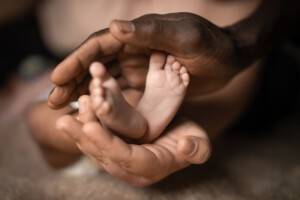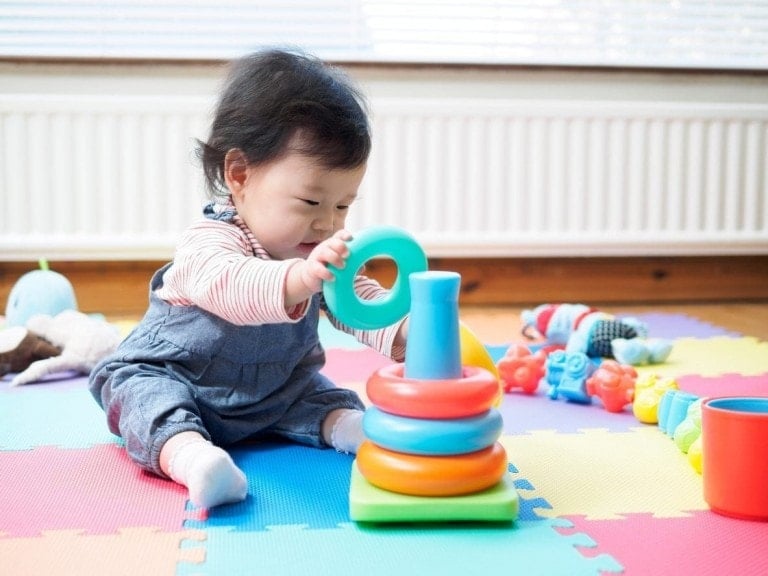When cold and flu season comes around, concerns about getting sick are even more amplified. This can be especially stressful for new moms who do their best to stay well for their baby and themselves. It’s important for new moms to take the proper precautions. Knowing what flu and COVID symptoms to look out for in babies and when to seek medical attention is critical. Below, we’ll break down the different illnesses that babies are at risk of catching during the winter months and how to best protect them from getting sick.
Common Cold and Flu
As you likely know, the flu is caused by specific influenza viruses.3 Several strains of the flu circulate every year during the colder months.4 Since babies’ immune systems are still developing, the flu is a serious illness for them.1 They’re at higher risk of experiencing complications that can lead to hospitalization.5 The same goes for the common cold. But given the hundreds of viruses responsible for the common cold, it’s estimated that babies will experience up to six to eight colds in their first year of life.1,6
It’s important to note that flu and common cold symptoms can be very similar. The main difference is that flu symptoms come on rapidly. Your baby will look and feel sick rather quickly. With a common cold, your baby’s symptoms will come on gradually and get progressively worse as the days pass.7
The first sign of a cold in babies is typically a runny or stuffy nose, with nasal discharge that starts out thin and clear. But it can turn thicker and yellowish-green over a couple of days.1 Other symptoms to look out for include:1,7,8
- Sneezing
- Coughing (especially at night)
- Fever
- Trouble sleeping
- Reduced appetite
- Difficulty feeding due to nasal congestion
- Fatigue
- Irritability
If your baby has the flu, they may experience vomiting, diarrhea, and/or chills in addition to the above common cold symptoms. There may also be symptoms you won’t see, including headache, sore throat, and body aches.5,7
Respiratory Conditions From Cold and/or Flu
When your baby is sick with either the cold or flu, you should closely monitor their symptoms. Their illness can quickly evolve into a more serious respiratory condition, including:1,10
- Croup: Croup is a viral infection that causes swelling around the vocal cords. If a cold advances into croup, your baby will exhibit difficulty breathing, hoarseness, a barking cough, and wheezing.8,9
- Respiratory syncytial virus (RSV): RSV is a respiratory infection that can affect people of all ages.10,11 It’s most serious in babies due to their underdeveloped airways. RSV is most common during the colder months.11 The symptoms are similar to the common cold, but more serious symptoms include labored breathing and wheezing.10,11
- Bronchiolitis: If your baby’s cold progresses into RSV, they can be at risk of it developing into a serious inflammatory respiratory condition called bronchiolitis, which affects the bronchioles (the smallest air passages in the lungs).11,12,13 This condition is one of the most common causes of hospitalization for infants.14 The most prevalent symptom is wheezing along with a cough.14,15
- Pneumonia: A cold or RSV can turn into pneumonia (an infection in the lungs) rather quickly.5,12 This can cause your baby to start experiencing shakes, chills, flushed skin, sweating, a high fever, abdominal pain/sensitivity, a worsening cough, and rapid or difficulty breathing.16,17,18
COVID-19
According to one study, the vast majority of newborns appear to be asymptomatic if they contract COVID-19.2 However, there’s still a risk of respiratory distress, fevers, malaise, diarrhea, and possibly respiratory failure.19,20 If your baby is a preemie, coronavirus poses a greater risk to your baby.19 It can result in severe respiratory distress requiring a ventilator, feeding and gut problems, and neurological problems.21,22,24
When To See a Doctor
If your baby is under 2 months or 3 months old, you should immediately contact their pediatrician if they start showing symptoms of any illness (including COVID), especially if they have a fever.23 If the symptoms are mild and relatively new, and your baby is older than 3 months, it’s okay to continue monitoring them to see if they worsen. However, regardless of your baby’s age, if you’re concerned about their health and don’t know what to do, it’s always encouraged to speak to their doctor.
There are certain serious COVID symptoms in babies that warrant an immediate call to the doctor, or in some cases, a trip to the emergency room:19,21,24,25,26,27
- A high fever or a fever that lasts longer than five to seven days (for babies under 3 months old, a high fever is 100.4 degrees or above, and for babies 3 months and older, a high fever is 101 degrees or higher)
- Signs of labored or inconsistent breathing (also look out for if they have retractions when they attempt to inhale)
- Baby is refusing to feed/eat, and there are signs of dehydration (such as fewer wet diapers)
- A persistent cough that lasts longer than 72 hours, especially if it’s croupy or wheezing or causing choking or vomiting
- Persistent vomiting and/or diarrhea
- Signs of thick green or bloody mucus from the nose and/or mouth
- Any signs of a rash or stiff neck
- Baby is consistently rubbing their ear, showing any other signs of physical discomfort, or exhibiting an off-sounding cry
- Baby’s lips or nail pads look blue (Note: take them to the emergency room immediately, as this is a sign of low oxygen)
How Can I Protect My Baby From Getting Sick?
One of the best ways to protect your baby from getting sick is breastfeeding.28,29 Breast milk contains many immune proteins, enzymes, and antibodies that can help protect your baby from influenza, common cold viruses, and COVID-19.28,29,30,31,32,33 Another important step in protecting your baby is limiting visitors during the newborn period — especially those who were recently sick or show symptoms of being ill. Also, ensure that any visitors have all the relevant vaccinations, including the flu shot. If your baby is 6 months or older, they should receive the flu shot as well.34 Lastly, always wash your hands thoroughly before handling your baby!
Trust Your Gut
The winter months can be unnerving for parents, especially when you have a newborn. It’s essential to keep an eye on your baby during this time, so closely monitor any flu or COVID symptoms that present themselves. Remember, you know your baby best. If you notice that they’re not acting like themselves, you can feel validated in calling the doctor to make sure it’s nothing serious.



































